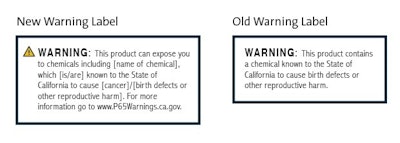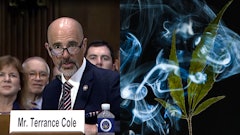
Sonoma Patient Group, the longest-running cannabis dispensary in Santa Rosa, Calif., agreed to pay a $40,000 legal settlement in May 2018. The lawsuit was just the latest iteration of a growing trend in California’s civil litigation landscape: Prop. 65 violations in the cannabis industry.
The dispensary had failed to provide sufficient warnings to customers that certain products contained—or rather, produced—a substance that the state of California had listed as a carcinogen. The substance in question was marijuana smoke, added to the state’s list in 2009.
And while Sonoma Patient Group had posted cancer warnings on-site, the lawsuit insisted that the signage was not up to code—not compliant with the evolving regulations that guide California’s cannabis industry and consumer protection laws.
San Francisco-based attorney Ann Grimaldi of Grimaldi Law Offices introduces Prop. 65 by reminding travelers that the first thing they see upon arriving in California is a warning sign in the jetway as they disembark from an airplane at LAX or SFO. “We see these signs everywhere," Grimaldi says. "The law itself is intended to be a right-to-know law.”
Marijuana smoke is on the Prop. 65 list as a carcinogen, along with hundreds of other substances. It was placed on the list after a scientific committee (appointed by the governor) approved the measure in a public hearing.
Since about 2015 or so, as legal cannabis retail entered the day-to-day consciousness of California residents, industry observers have seen a growing trend in litigation for failure to provide warnings about this listed carcinogen.
“Unfortunately, word isn't getting out to the cannabis industry here in California, at least not as extensively as I would have hoped,” Grimaldi says. “It feels predatory because it is predatory.”
The $40,000 Sonoma Patient Group settlement was paid mostly to the California Environmental Health Hazard Assessment and to the local district attorney. But the lawsuit was initially trigged by an apparent “investigation” by the Center for Advanced Public Awareness, a nonprofit that has teed up dozens of these Prop. 65 lawsuits in recent years. (Prop. 65 violations can be enforced by both public prosecutors and by private citizens.)
In 2017 alone, the Center for Advanced Public Awareness was party to 13 civil settlements that totaled $643,000. (In terms of back-of-the-envelope math, that’s just shy of $50,000 per settlement.)
“Once you get caught up in this net, as any business, cannabis or otherwise,” Grimaldi says, “it's really hard to extricate yourself and it takes a lot of money to do so. … The regs are pretty burdensome to comply with and costly to comply with, and it's not like cannabis business have a ton of money to throw around at plaintiffs wanting to extract money out of them.
“It's an unfortunate situation that can be cured with education,” she says.
And this isn’t just a compliance burden for the cannabis industry in California; Prop. 65 intersects with any kind of product distribution. But for nascent cannabis operations caught in a world where major news organizations run frequent stories on scientific studies into the medical properties of cannabis, the confusion can compound quickly.
New cancer warning regulations will go into effect Aug. 30, and California dispensaries had better be prepared. The new rules will tighten the definitions of what, exactly, constitutes compliance with Prop. 65.
What Sonoma Patient Group learned is that it is now insufficient merely to have signage on-site; rather, warnings must be posted either on specific products or at the “point of display”—on the shelf or in the case where products are visible to customers. A Superior Court judge ordered the dispensary to post warnings on product packaging, at the point of display, at the entry door and on the business's website.

The supplier, vendor or product manufacturer has the primary obligation to warn, but dispensary owners and buyers would do well to ensure that the conversation about Prop. 65 regulations occurs often with those parties. Under California’s cannabis industry regulations, dispensary employees may not tamper with or alter a product label in any way, so there’s no room for dispensaries to add Prop. 65 warnings after the fact. “You really need to be working with your vendor to get that done,” Grimaldi says.
If a product is manufactured and packaged by the same company that owns the dispensary in question, then the dispensary indeed will carry the obligation to provide Prop. 65 cancer warnings on its individual products.
Dispensary owners can further ensure their compliance by posting warning signs at the point of display.
“When a plaintiff goes after a Prop 65 violation, they name everybody that they can … in order to leverage the pressure for settlement,” Grimaldi says.
Prop. 65 violations can impact the entire supply chain in the California cannabis industry. Education, as Grimaldi points out, is the best defense against costly litigation.
“Everyone I've run across, in terms of clients—everyone wants to comply,” Grimaldi says. “It's just that this law is very complicated, and it's not always easy to figure out what it means to comply.”
Top photo courtesy of Adobe Stock

























